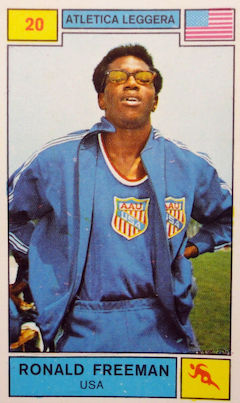
Sport: Track & Field
Born: June 12, 1947
Town: Elizabeth, New Jersey
Ronald J. Freeman was born June 12, 1947 in Elizabeth, NJ. Ron played a number of different sports growing up in the city, but it was his blinding speed that made him a standout. At Thomas Jefferson High, he became the star of the track team and graduated in 1965. He attended Kean College (now Kean University) in neighboring Union.
As Ron began competing nationally and internationally, he was occasionally confused with an older 400-meter specialist named Ron Freeman, who had attended Jefferson High School in Los Angeles and was a member of Baldy Castillo’s famous track team at Arizona State. That confusion only got worse in the age of the Internet, as the two runners’ records and life stories are now hopelessly jumbled together.
Elizabeth’s Ron Freeman made the Olympic team in 1968 in the 400 meters, which in and of itself was a major achievement. At the US Olympic trials, he was up against five other runners who ranked in the world Top 10. Lee Evans and Larry James set world records with times of 44.0, while Ron ran a 44.6 to grab the final 400 slot. In the finals at Mexico City, Ron won the bronze medal, as Evans and James became the first runners to break 44 seconds.
The 1968 Olympics produced several jaw-dropping performances, most notably Bob Beamon’s record-shattering long jump. Heading into the Summer Games, the goal of the 4 x 400 relay squad was to obliterate the 3-minute mark. Ron and his teammates even made up a theme song: “2:55 & That Ain’t No jive.”
In the 4 x 400 meter finals, it was Ron’s turn to make history. Vince Matthews ran the first leg and surprisingly found himself neck-and-neck with Charles Asati of Kenya. Ron grabbed the baton and exploded into the lead, running his section in 43.2 seconds—the fastest-ever 400 meter time. Prior to the Olympics, Sports Illustrated predicted Ron would run a 46-second leg. James and Evans finished the race 30 meters ahead of the pack with a new world-record mark of 2.56.15. Of all the new marks set in Mexico City, this one stood the longest—until 1992.
On the medal stand, Ron and his teammates lifted black berets to show solidarity with the Civil Rights movement and to advocate for human rights around the world. Previously, John Carlos and Tommie Smith—college teammates of Evans—had given the Black Power salute on the stand.
After the Olympics, Ron went on to earn a degree in Political Science and a masters in Student Personnel. He focused his professional efforts on advancing the issues of Civil Rights, Women’s Rights and at-risk urban youth. An after-school program Ron started in his hometown of Elizabeth during the 1970s is still running today.
In 1998, Ron started an organization that he had brainstormed with Evans and James decades earlier called the International Medalist Association, whose goal was to empower inner-city children—at first in Baltimore but later throughout the US and Africa. One of the key components of IMA’s programming is to introduce structured sports and recreation to schools.
In 2006, Ron left the US for the African nation of Guinea to continue his work with this group after that country became a democracy. He had previously worked in Guinea for the US State Department. IMA has partnered with the United Nations, the World Health Organization and the US Departments of State and of Labor. In 2017, Ron received the Athletes In Excellence award for his work.